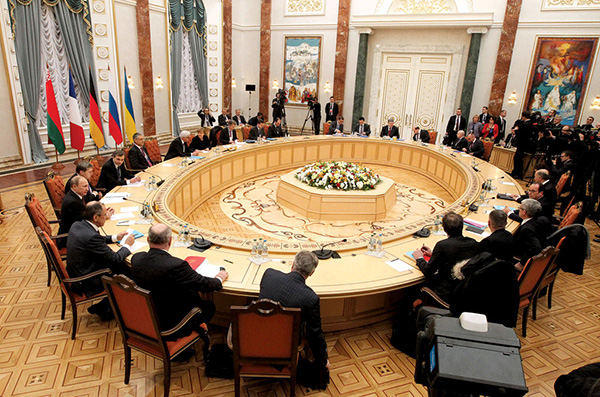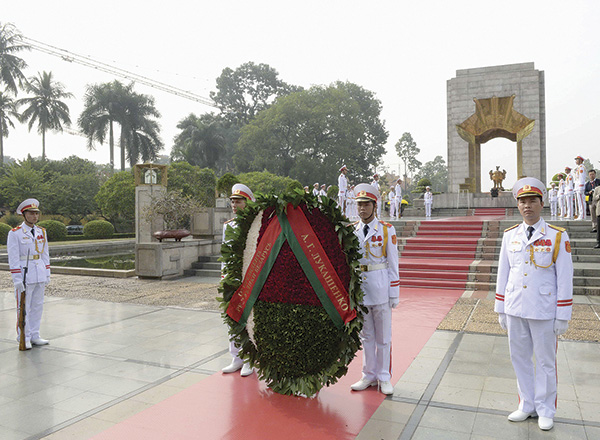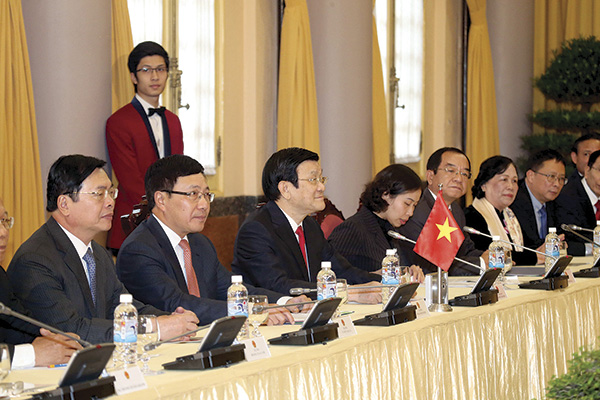Relying on a theory from the book ‘The Fatal 15th Year’, this said year of each century is thought to set the tone for the whole century. As distinct from previous years, when many parallels were voiced relating to World War one, there is a feeling today that the world — at least in Europe — is not about to spiral into a new historical disaster. The Ukrainian conflict has not transformed into an all-out war as pessimists predicted a couple of years ago. On the whole, 2016 is viewed more optimistically.

Moment of truth for Europe

On April 12th, President Alexander Lukashenko welcomed the German Chancellor, Angela Merkel, the French President, François Hollande, and the presidents of Russia and Ukraine, Vladimir Putin and Petro Poroshenko. After 15 hours of continuous discussion, they met journalists to demonstrate the Minsk agreements they had just signed. Minsk became the launch pad of a new peace process which continues to define expectations of change for the better.
To realise these changes, international relations are guided by accepted norms. One of them dating back to Winston Churchill who said, “Britain has no lasting friends but lasting interests.” The Minsk agreement has managed to propose a new interpretation of this pragmatic formula as voiced by the great man. The quote can now read: ‘Minsk has lasting friends and lasting interests’. Belarus is situated in the centre of Europe — both geographically and politically. Accordingly, it’s in our interests to act as a bridge of peace rather than war, to be a bridge of cooperation rather than confrontation. This formula is the basis of Minsk’s major foreign political policy for the future.
Minsk is an anchor in a turbulent world
Before speaking about Belarus’ role as a geopolitical bridge, we should firstly assess our major domestic political event: The Presidential elections on October 11th, 2015. For the last twenty years President Lukashenko has been head of the independent Belarusian state — ensuring continuity in the most recent era of Belarusian history. The West should see this from the perspective of the preservation and development of a sovereign Belarusian state. Today Belarus is among the few European countries which enjoys stable development and has no problems with its continental neighbours.
The elections of 2015 demonstrated that the role of a political bridge — symbolising the nation’s unity — is important for domestic development as well. It ensures progress without interruption or power vacuums, thus avoiding a Ukrainian situation, where a gap between the country’s west and east, between its elite and the rest of society, resulted in social conflict. In another vivid example, a historical gap between traditionalism and forced democratisation has resulted in a major war in the Middle East.
Belarusian democratisation is developing gradually; President Lukashenko plays the role of a political anchor which ensures stability of the state vessel. Belarus’ sovereignty and independence is the key point for all Belarusians; irrespective of changes and reforms which might take place in the future. The recent Presidential elections are seen as a significant precursor to the Belarusian parliamentary elections scheduled for 2016. Three candidates failed to offer serious competition to President Lukashenko but, relying on their accumulated experience, they are now preparing to take part in the parliamentary campaign. Public discussions on the path of Belarus’ development are likely to continue.
On leaving our country after the Presidential elections, a delegation of foreign observers — including representatives of the OSCE/ODIHR, the OSCE Parliamentary Assembly and the Council of Europe’s Parliamentary Assembly — promised to return in 2016. Their recommendations deal with changes in election legislation and the expansion of party roles. Importantly, the political forces which took part in the Presidential elections were given a powerful impetus to regulate themselves in the parliamentary elections. They all demonstrate an interest in ensuring the country’s development without political vacuums but with the continuation of an independent Belarusian history.
Belarus to act as guarantee of security
One of the major foreign political results of the last year which will define the 2016 agenda is rooted in the West’s attitude towards Minsk. At present, this attitude is more realistic, pragmatic and respectful than it has been in the past. What has changed the EU’s view? Firstly, Minsk has become a successful venue where peaceful negotiations on the settlement of the Ukrainian conflict were facilitated.
President Lukashenko reaffirmed that Belarusian, Russians and Ukrainians have always been and remain fraternal nations. Foreign Minister Vladimir Makei explains the key foreign political belief, “We’ve never attempted to play to the benefit of any side to damage another side. We are sincerely interested in ensuring peace and stability in our region but these should not be detrimental to our relations with Russia. Our three nations have always lived together. The existing tension in our region, including that between two of our nations is unsettling. If two brothers quarrel, there should be the third who will make efforts to reconcile them. In this respect, we are not merely playing the role of a mediator but are trying to do everything possible to ensure the Ukrainian nation is at peace.”
This is the philosophy of Minsk’s mission as a mediator. The Ukrainian crisis has led the whole of Europe into deadlock. Whatever geopolitical prerequisites for its origin existed, no side wishes to start a fully-fledged war. Minsk has become an anchor for the ship of European diplomacy which is sinking on the Dnieper.
The Ukrainian conflict has thrown light on the fundamental problem of European security. Old ‘Helsinki’ rules are no longer relevant, indeed, were not after Kosovo. Progress in diplomatic policy is required. The European Union has previously failed to take into consideration the opinion of other partners, namely Russia. Accordingly, the development of clear policy, to be adopted by all sides, is high on the agenda. This means that the Minsk process will continue — though on a wider, all European, scale. Some analysts predict that Minsk-3 might follow Minsk-2. Are these ambitious plans? In fact, Minsk has become a means of ensuring security in Europe; this refers not only to the settlement in the Ukraine. Belarus is situated at the crossroads of the European continent’s major transport and trading routes, while significantly contributing to the strengthening of security. The country ensures a secure shield against drug trafficking and illegal migration, while successfully counteracting human trafficking.
Mr. Makei views these as prerequisites for normalising relations with the European Union. “In the course of time, the EU has begun to understand that Belarus is not a puppet in someone’s hands but an independent state which keeps to its independent policy proceeding from the national interests. Of course, a combination of circumstances also helped the EU to realise the principles by which Belarus is guided when making foreign and domestic political decisions. We have no naïve expectations that all roads will be open tomorrow and the EU will embrace Belarus. However, a tendency to normalise relations is at least present,” he says.
In this respect, a statement made by the US State Department Office is topical. On December 16th, the USA and Belarus had the second session of the working group on democracy and human rights. The USA has noted that increased respect for democracy and human rights in Belarus is a major condition for the improvement of bilateral relations and is valuable for the country’s prosperity. Taking into consideration further positive steps in the field of democracy and human rights, the USA will study the possibility of reciprocal moves in the prospects of the final normalisation of relations. The USA also supports the idea of sovereignty, territorial integrity and independence of Belarus.
Belarusian resource for old Europe
The normalisation of relations with our western partners is one of the major political trends of 2016. What are the grounds for this optimism? Firstly, the fact that the Belarusian resource was neglected until the old European order faced new challenges. Under pressure from the increasing migration process, the fact that Belarus can act as an example of a traditional Christian civilisation is perceived from a new angle. The country can become a keeper of European traditional values in the classical sense. The Belarusian nation is a unique example of inter-ethnical solidarity. Modern Europe is moving towards this and Belarus can share its experiences with partners and neighbours.
The economic desire to strengthen our country’s ties with the EU is also present. In the last twenty years, mutual turnover has increased 40 fold and among Belarus’ major trading partners in Europe are the UK, the Netherlands, Germany, Lithuania, Italy, Poland and Latvia. Certain countries have played the role of an icebreaker in relations between Minsk and Brussels. In 2014, consultations on issues of modernisation and talks on simplified visa procedures and readmission began. In 2015, Belarus joined the Bologna Process, also receiving the status of an observer in the Northern Dimension.
In recent years, some mechanisms of interdepartmental interaction with Germany have been opened. In relations with France, a bilateral intergovernmental commission on trade and economic co-operation was set up and, in 2015, its first session was held. There has also been the launch of a project to realisation of joint investment and production plans.
At the same time, Belarus’ lack of access to the EU’s preferential trade agreements and financial resources hampers full normalisation of relations. Moreover, the legal base is underdeveloped. Our country is ready to play its part in lifting all barriers and expects its European partners will follow a similarly open, fair and constructive approach.
The Ambassador Extraordinary and Plenipotentiary of Belarus to France, Pavel Latushko, comments, “I think the period of pragmatism in our relations with the European Union is beginning. European politicians and decision makers have probably realised that the policy of pressure and sanctions yield no result. It’s possible to establish relations primarily through dialogue, while solving existing problems and finding solutions to them. I hope that 2016 will be a positive year in Belarus-EU relations.”
Integration of integrations
Minsk is known as the informal capital of post-Soviet integration. The headquarters of the CIS — where a free trade zone operates — are situated here and the major agreements on the establishment of the Eurasian Economic Union (aimed at Eurasian economic integration) were signed. The process never stops and as well as its achievements, it sets new challenges for its participants. Sadly, many withdrawals and restrictions exist in the Eurasian Economic Union; these hamper the prompt establishment of the single economic space.
The ceasing of the free trade regime between Russia and the Ukraine has added another challenge. This is the result of the beginning of a free trade zone operating between Ukraine and the EU and Kiev’s joining the EU’s anti-Russia sanctions. Under these difficult conditions, Belarus is consistently defending its national interests. Minsk and Kiev have agreed a plan of further action to lift restrictions on mutual trade. This was put into place several days prior to the beginning of the EU-Ukraine free trade zone operation. The Ukrainian President signed a law on Measures to Stimulate Foreign Economic Activity: from January 1st, 2016, it is abolishing an additional import fee applied to Belarusian produce.
The Belarusian Foreign Ministry is pleased: the lifting of the additional import fee will make it possible to eliminate the operating tariff barriers on the access of Belarusian produce to the Ukrainian market — while creating grounds for the increase of exports of Belarusian products to Ukraine.
In general, our country follows the philosophy of ‘optimum integration’ which envisages the co-operation of not only two major integration blocks of the continent: the European Union and the Eurasian Economic Union. The third partner — China — is also present in the process. If the 21st century is to become ‘Chinese’ (as analysts have predicted due to the country’s high economic growth), then this trend will affect the European continent as well. This is a coupling of projects of the Silk Road Economic Belt and the Eurasian Economic Union. These projects jointly aim at co-operation with the EU. Movement towards the common economic space on the continent will no doubt entail a global synergetic effect.
Last year, an agreement was signed on the establishment of a free trade zone between the Eurasian Economic Union and Vietnam. One of the first foreign visits of the re-elected President Lukashenko was a state trip to Vietnam.

Gates to South-East Asia
The Ambassador Extraordinary and Plenipotentiary of Belarus to Vietnam, Valery Sadokho, talks about Vietnam’s significance for the promotion of Belarusian economic interests in South-East Asia, “An agreement, signed between the Eurasian Economic Union and Vietnam in May 2015, opens new horizons for the development of trade and economic relations between our countries. Taking into consideration the established free trade zone, we view Vietnam as a foothold for our presence in South-East Asia and for joint sales of our produce to the neighbouring states, in particular, ASEAN. ASEAN is among the major world blocks: it boasts a population of over 600m, accumulated GDP of more than $2.5 trillion, foreign trade of over $2trillion and sustainable economic development.”
In 2015, integration processes in South-East Asia achieved a new level when the ASEAN was established. Co-operation will strengthen three major avenues: politics and security, economy, and the socio-cultural sphere. The single market of the Association is now operational; despite some exemptions, it lifts all barriers to trade between South-East Asian states.

The establishment of the free trade zone between the Eurasian Economic Union and Vietnam has created an additional impetus to the growth of Belarusian exports to South-East Asia. On signing the agreement on free trade with Vietnam, Belarus will be able to integrate with a major world economic block: ASEAN. This document is also politically grounded — making it possible to strengthen the strategic partnership of both sides based on many years of close co-operation between the EAEU states and Vietnam, while confirming our adherence to the development of trade and co-operation in the Asian-Pacific area.
In this respect, industrial co-operation, development and the mining of natural resources and possible joint realisation of agricultural and infrastructure projects are the key avenues of co-operation with Vietnam. Among the major existing projects are the expansion of the acting MAZ truck assembling facility in Vietnam on the basis of the local BEAM machine building corporation and the organisation of co-operation in the sphere of assembling some models of trucks adapted to the local market — jointly with Vietnam’s TMT Motor corporation.
In 2015, MAZ liaised with another major Vietnamese machine building corporation — SAMCO — as part of an industrial collaboration. First samples of low-floored city buses were produced and a contract was signed to manufacture another 30 MAZ passenger vehicles in 2016, in Ho Chi Minh. There are good prospects regarding the exports of Belarusian fertilisers, BelAZ dump trucks, tyres, medicines, food and special machinery to Vietnam. Among the planned major projects are the establishment of assembly facilities for Belarusian engines, tractors and agricultural machinery, joint ventures for production of milk products, and complex fertilisers using Belarusian raw materials and technology.
It’s important for Belarusian enterprises to use the existing experience of successful co-operation with Vietnamese companies. In particular, Mekong Machinery, from Ho Chi Minh, has liaised with MTZ JSC for over 20 years, exporting thousands of Belarusian tractors (which have proven their high quality) to the markets of Vietnam and neighbouring South-East states. Relying on these markets, it’s important to promote our economic interests not only to the Vietnamese market but also other ASEAN markets.
President Lukashenko’s recent visit and the character of the talks confirm that the two leaders are aiming at a full strategic partnership. It’s likely that Vietnam will become a true ‘gateway’ for Belarus to South-East Asia.
By Nina Romanova











